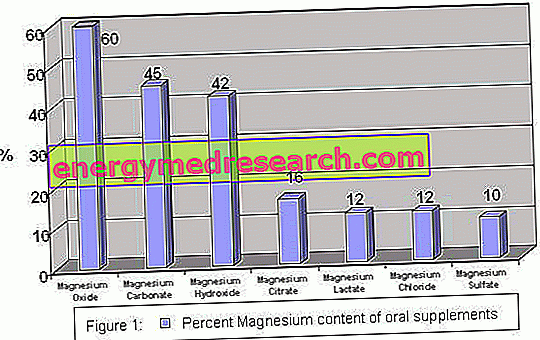Generality
Magnesium deficiency can develop for various reasons, due to insufficient dietary intake, increased need, excessive losses, altered intestinal absorption or prolonged intake of particular drugs (eg proton pump inhibitors, including omeprazole).
The symptoms that result are the most disparate and can regress after an adequate administration of magnesium orally or intravenously.
In medical language, the lack of magnesium in the blood is called hypomagnesemia ; in the most serious cases, this condition can be very dangerous, given the possible onset of severe cardiac arrhythmias.
Causes
Chronic alcoholism is the condition most frequently associated with a secondary magnesium deficiency, both due to a reduced intake and to the excessive renal excretion induced by ethanol.
Magnesium deficiency due to insufficient dietary intake is common in prolonged fasting and in Kwashiorkor .
Although in industrialized countries many people do not reach the recommended intake levels, normally this mild deficiency is asymptomatic or paucisintomatic.
More severe deficiencies may be due to reduced intestinal absorption, such as in the presence of pancreatitis, steatorrhea, large surgical resections of the small intestine, Crohn's disease, ulcerative colitis, celiac disease and malabsorption syndromes in general.
Magnesium deficiencies can also be caused by diseases of the thyroid or parathyroid glands.
Severe magnesium losses can trigger deficiency syndromes ; this is the case of protracted diarrhea and vomiting, therapy with certain drugs (such as some diuretics or laxatives), diabetic acidosis, excessive lactation, intense and prolonged sporting activity, chronic renal failure and hyperaldosteronism primitive.
Symptoms
Magnesium deficiency symptoms are quite varied and can include: mental confusion, mood variability, osteo-tendon hyperreflexia, muscle incoordination, tremors, paresthesia, tetany not differentiable from that present in hypocalcemia, muscle cramps, cardiac arrhythmias and hypertension blood.
In women of fertile age, magnesium deficiency has been associated with premenstrual syndrome.
Diagnosis
Identifying a magnesium deficiency can be difficult, especially in milder forms.
The diagnosis can be based on the dosage of magnesium in the blood, with a search for hypomagnesemia, on the reduction of the magnesium content in the erythrocytes or on the disappearance of the mineral in the urine. In this regard, intramuscular magnesium loading tests are very useful, followed by urinary excretion monitoring: in case of depletion, most of the injected magnesium is retained, whereas when the balance is positive most of the mineral is eliminated in the urine.
Treatment
Magnesium can be administered orally via supplements containing one or more of its salts, such as magnesium citrate, magnesium carbonate, magnesium oxide (poorly absorbed), magnesium sulfate, magnesium aspartate or magnesium chloride.
In general, it is preferable to use organic magnesium salts (gluconate, aspartate, pyruvate, malate, citrate, pidolate, lactate, orotate, etc.), since they are better absorbed in the intestine.
An excess of these supplements can have a laxative effect.

If the deficiency is mild, it can be easily filled by increasing the intake of foods rich in magnesium, such as vegetables - especially those with green leaves - peanuts and whole grains.
In severe cases, when supplements may be insufficient, magnesium sulfate is administered intramuscularly.



